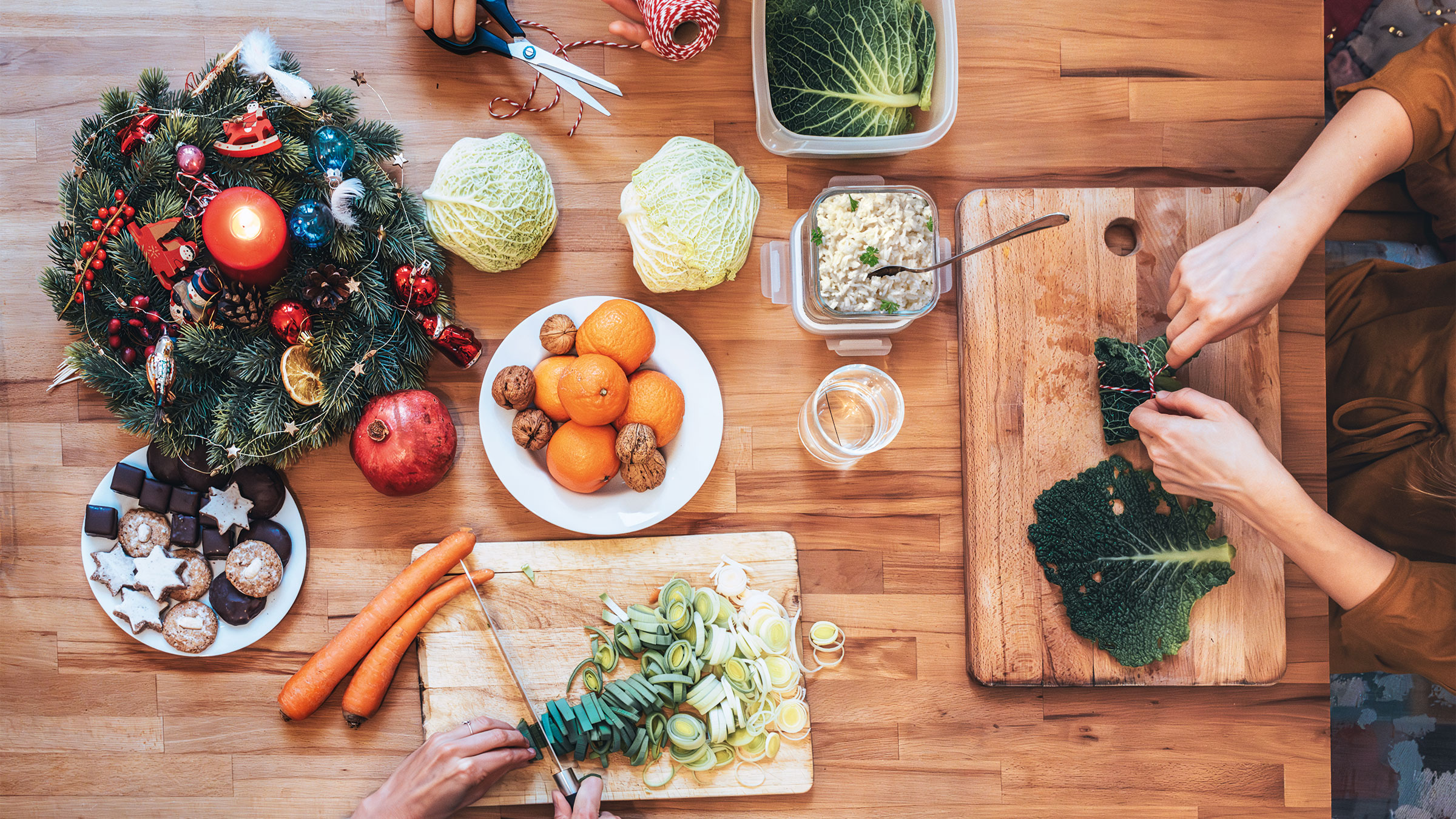A holiday meal can be an embodied experience of Thich Nhat Hanh’s teaching on “interbeing,” the understanding that we are all interconnected not only with one another, but with all of life itself—from the past, present, and into the future.
Holidays meals at my house are potluck gatherings of family members (biological and chosen), friends, and strangers—all coming together to be nourished by the recipes and the company of one another.
My family is blended, extended, mixed, large, loud, multicultural, international, multigenerational. At dinnertime, after a day of preparation by many hands, the food is arrayed on every surface of our kitchen, smorgasbord-style. The pelau, a Trinidadian dish my husband’s Jamaican mother taught him, sits beside my own mother’s broccoli slaw—her updated take on the coleslaw that was my Jewish grandfather’s proud, if incongruous, contribution to holiday meals. We enjoy jollof rice, courtesy of our Ghanaian friend’s mother, and Turkish Delight, brought by the Turkish student, far from home, who has joined us this year. And to think—all of this delicious food started as seeds in soil, nourished by the sun and rain, pollinated by the pollinators, and crafted into recipes by ancestors from far-flung lands.
Just before digging in, we do “the wave” by initiating a ripple of arms to move through our connected hands. It travels from elder to spouse to stranger to parent to child to teenager to friend and so on—a flow of energy moving through us all. For this sacred moment, each of us is more than just ourselves; we are one big, interconnected, breathing being offering and receiving nourishment, giggles, gratitude, and love. We inter-are.
To honor our interconnectedness, many Buddhists chant “the five contemplations” before eating. These ancient reflections are a reminder and a vow, a nourishment in and of themselves. Thich Nhat Hahn offered this beautiful variation:
This food is a gift of the earth, the sky, numerous living beings, and much hard and loving work.
May we eat with mindfulness and gratitude so as to be worthy to receive this food.
May we recognize and transform unwholesome mental formations, especially our greed, and learn to eat with moderation.
May we keep our compassion alive by eating in such a way that reduces the suffering of living beings, stops contributing to climate change, and heals and preserves our precious planet.
We accept this food so that we may nurture our brotherhood and sisterhood, build our sangha, and nourish our ideal of serving all living beings.
When we read or speak these words, we are reminded to look deeply into our food and our behaviors. These contemplations encourage compassionate action, reaffirm our responsibility to all those whose lives we touch, and center gratitude, understanding, and love. This wisdom is echoed in a Christmas sermon delivered by Dr. Martin Luther King Jr., who described a breakfast tableau reminiscent of my own holiday table:
We are all caught in a network of inescapable mutuality, tied into a single garment of destiny…. Did you ever stop to think that you can’t leave for your job in the morning without being dependent on most of the world?… You go into the kitchen to drink your coffee … and that’s poured into your cup by a South American [person]. Maybe you want tea, that’s poured by a Chinese [person]. Or maybe you’re desirous of having cocoa … and that’s poured by a West African [person]. And then you reach over for your toast and that’s given to you at the hands of an English-speaking farmer…. And before you’ve finished eating breakfast in the morning, you’ve depended on more than half the world. This is the way our universe is structured, this is its interrelated quality. We aren’t going to have peace on Earth until we recognize this basic fact of the interrelated structure of all reality.
Dr. King and the Venerable Thich Nhat Hanh were comrades in the struggle for peace and social justice; they were bodhisattvas who dedicated their lives to the project of awakening other beings and helping them move in the direction of understanding and love. As a human collective, we have been fed by their wisdom. They teach us that eating isn’t just consumption; it is a conversation—a relationship—with all of life itself.
This holiday season, consider inviting the wisdom of these bodhisattvas to join you at your table. You might read Dr. King’s sermon aloud with your family and friends, passing it hand to hand, so that each person says a sentence or two. You could contemplate together the interrelated structure of reality—the farmers, drivers, factory workers, shopkeepers, cooks, and countless other people whose labor created your meal in this moment. Take some time to consider them through the eyes of gratitude.
You might also recite Thich Nhat Hahn’s five contemplations, reflecting on the meaning of each one, discussing the feelings they evoke, the insights they offer. Allow this to be an opportunity to reflect on what you buy, how you eat, and what relationship this may have to climate change. Consider how you can contribute to healing and preserving our precious planet so that your family and all families—tied together in a single garment of destiny—can be fed.
At your holiday meal, circle around the food to give thanks for this day of life, for this gift of nourishment, for your loved ones present and absent, and for the well-being of all beings everywhere. Perhaps you can hold hands and breathe together, looking around at the faces—familiar, unfamiliar, and ancestral. (The countenances of loved ones long gone might be here in the faces of their children and grandchildren, including in your very own face.)
Holiday meals provide an opportunity to receive and share food with mindfulness, gratitude, respect, and awe. The wisdom teachings of interbeing can surge through us like a wave, and offer us a taste of enlightenment.

